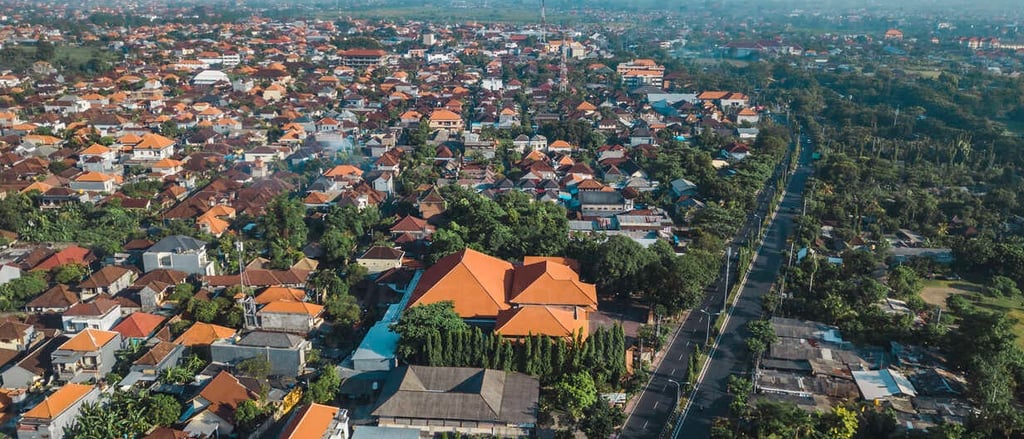Land Ownership for Foreigners in Indonesia: Understanding HGB, HM, and Other Rights
4/25/20253 min read


Aerial view of Sanur, Bali
Indonesia's Foreign Real Estate Investment Market: Navigating Legal Complexities
Indonesia remains a compelling destination for foreign real estate investors, with the market reaching nearly $100 billion in 2024 and projected to grow to ~$150 billion by 2033. With growing industrial zones, tourism assets, and rising urban demand, the country's property market offers significant long-term potential. However, Indonesia's land ownership laws are among the most restrictive in Southeast Asia. Foreigners are constitutionally barred from owning freehold land and must navigate alternative legal structures to gain access to real property.
Understanding the distinctions between Hak Milik (HM), Hak Guna Bangunan (HGB), and Hak Pakai is critical not only to secure investments but to avoid costly legal disputes or outright fraud, particularly as 23% of Indonesian consumers reported losing money to scams in 2024—up from 19% in 2023.
The Legal Framework: Land Rights in Indonesia
Indonesia’s agrarian law prohibits foreign individuals from directly holding land under Hak Milik, the strongest form of land ownership. Instead, foreigners must rely on legally sanctioned alternatives, each carrying specific rights and limitations.
1. Hak Milik (HM) – Freehold Ownership
Eligibility: Indonesian citizens only
Nature: Full, perpetual ownership
Transferability: Freely transferable among Indonesian citizens
Foreign Access: Prohibited
Nominee arrangements—where land is held by an Indonesian citizen on behalf of a foreign investor—are widely used but carry substantial legal risk and are not enforceable under Indonesian law.
2. Hak Guna Bangunan (HGB) – Right to Build
Eligibility: Indonesian entities and foreign-owned companies (PT PMA)
Term: 30 years, extendable to 80 years total
Use: Commercial or residential development
Transferability: Yes
Mortgageable: Yes
Hak Guna Bangunan (HGB) is the primary legal mechanism for foreign investors seeking control over land for development¹⁴. Rights are held through a registered legal entity and must comply with Indonesia’s foreign investment regulations.
3. Hak Pakai – Right to Use
Eligibility: Foreign individuals domiciled in Indonesia (e.g., KITAS/KITAP holders)
Term: 25 years, extendable
Use: Residential only
Transferability: Limited
Mortgageable: Restricted
Hak Pakai provides a limited but legally recognized pathway for foreign individuals seeking to acquire residential property for personal use. At present, foreigners account for only a small fraction of total property transactions in Indonesia.
4. Hak Sewa – Leasehold
Eligibility: Foreign individuals and entities
Term: Up to 25–30 years (contractual)
Use: Flexible
Transferability: Yes (contractual rights only)
Mortgageable: No
Lease arrangements are widely used in Bali and other tourism zones. However, the legal enforceability of such contracts depends on proper registration, zoning compliance, and clear land title documentation.
Case Studies: When the Legal Structure Fails
Case 1: Princess Lolowah's $37 Million Loss
Between 2011 and 2018, Saudi royal Princess Lolowah binti Mohammed Al-Saud transferred more than $37 million to Indonesian nationals to develop luxury resorts in Bali. Despite the payments, no completed property was delivered. Subsequent investigations revealed that the land was never transferred into a structure that would have granted her legal reminder—no Hak Guna Bangunan (HGB) or Hak Pakai was registered in her name or through a valid legal entity. The local counterparties retained title, and additional parties later emerged with competing claims. The princess also lost an additional $500,000 on an unrelated parcel that was never legally available for sale.
Case 2: Golden City Fraud in Sumbawa
American investor Christopher Smith was promised a 99-year lease and the development of a 300-unit housing project in Sumbawa. Relying on these representations, he paid more than $7.5 million. When he inspected the site in 2020, no construction had begun, and the land remained under third-party ownership. The promised rights, allegedly structured as a leasehold (Hak Sewa), were never registered. Smith ultimately filed a criminal complaint after being denied access to the land
Conclusion: Compliance Is Non-Negotiable
Both historical cases illustrate the consequences of investing without proper legal safeguards and the importance of self-investigationm confirming that the appropriate governmental procedures have been followed . Foreigners cannot hold Hak Milik titles, and any attempt to bypass this restriction—whether through nominee schemes or verbal agreements, exposes investors to legal voids and financial loss. Adhering to legal structures is not only prudent, but essential when investing in Southeast Asia's largest economy.
Sources:
Indonesia Population Statistics Report, Central Bureau of Statistics (BPS), 2024
Indonesia Urbanization Rate Annual Report, World Bank Urban Development Data, 2024
Foreign Direct Investment in Indonesia Real Estate Sector, Indonesia Investment Coordinating Board (BKPM), Q2 2024
Indonesia Land Ownership Laws and Regulations, Ministry of Agrarian Affairs and Spatial Planning, 2024
The Jakarta Post. (2020, January 28). Saudi princess reports losing US$37 million in Bali property scam. The Jakarta Post.
ANTARA News. (2023, October 5). Polisi selidiki penipuan investasi rugikan WNA Rp7,5 miliar [Police investigate investment fraud harming foreign national]. Antara News Bali.